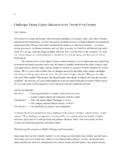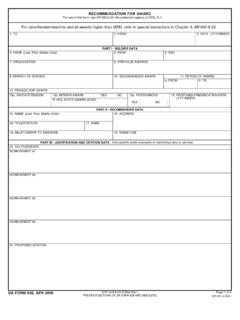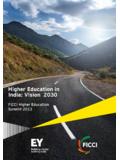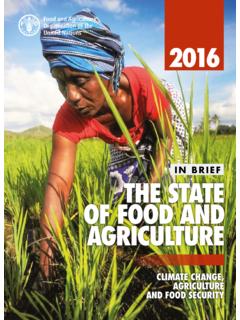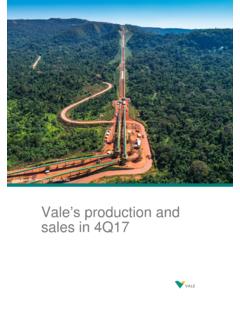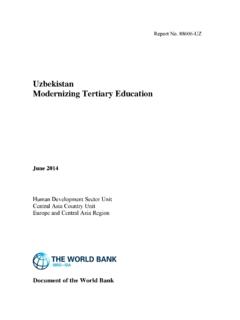Transcription of Quality Assurance in Higher Education in Chile - …
1 1 Quality Assurance in Higher Education in Chile November 2012 REVIEWS OF NATIONAL POLICIES FOR Education 2 FOREWORD Growth and diversity have characterised Higher Education in most OECD countries in recent decades. Nowadays, Higher Education provides a range of new kinds of Education and training to an increasingly heterogeneous student body, scarcely imaginable in the past. One of the main challenges that face Governments is how to address the persistent inequality in access to high Quality post-secondary Education . When in 2006 OECD Ministers met to consider developments in Higher Education , a key conclusion of their discussion was the need to shift the policy focus from quantity to Quality , from student numbers to learning outcomes. Finding the right approach to fostering high Quality Education for all, in a diversified system of autonomous institutions, is crucial if graduates are to be prepared to participate effectively in the knowledge-based economy and society.
2 Chile is no exception to these trends. In the past two decades Chilean Higher Education has experienced a dramatic increase in student numbers, and rapid growth in the range of institutions and the programmes they offer. But wider participation and diversification are only part of the story. Chilean society remains highly unequal in economic and social terms, and the Quality of the academic, technical and professional programmes on offer is uneven. The fact that Chilean students, or their families, have to directly pay a substantial share of the costs of their courses has focused attention on the value for money that they receive and their chances of finding a worthwhile career after graduation. The establishment of a culture of Quality in Higher Education which goes beyond accreditation, and the provision of accurate and reliable information, have become issues of concern not only to institutions, students and employers but to a wider public.
3 For these reasons the present report on the Chilean Quality Assurance System in Higher Education has been prepared at the request of the Chilean Government. The report aims at providing a set of core principles based on international practice on the basis of which Chile can improve the existing Quality Assurance arrangements. Setting a solid basis for Quality enhancement is key to creating a strong Quality culture. The publication draws on meetings and interviews carried out during a review visit in August 2012, and a self-evaluation report prepared by the Higher Education Division in the Ministry of Education (DIVESUP), as well as additional information provided to the review team, notably the reports written by each of the stakeholders participating in the Comisi n de Trabajo, coordinated and run by the DIVESUP prior to the review team s visit.
4 The report is the work of an OECD review team led by Richard Yelland, Head of the Policy Advice and Implementation Division at the Directorate for Education and which included Fiona Crozier (UK), Jane Knight (Canada), Rob McIntosh (New Zealand), Salvador Malo (Mexico) and Queralt Capsada (on secondment to the OECD Secretariat from the Fundaci Jaume Bofill, Catalonia, Spain). The authors are indebted to all those with whom they spoke during their interviews: including elected politicians, government officials, students, employers, leaders and staff of Higher Education institutions and of the responsible state agencies, as well as other informed observers. The discussions and information that they provided constitutes the basis of the report but the report itself is the work of the OECD review team and is published under the responsibility of the Secretary-General.
5 The review team thanks all those involved and 3 especially Christian Blanco Jaksic from the Ministry for Education , for his invaluable support before, during and after the review team s visit. 4 TABLE OF CONTENTS FOREWORD .. 2 ACRONYMS AND ABBREVIATIONS .. 7 EXECUTIVE SUMMARY .. 9 CHAPTER 1. THE CHILEAN CONTEXT .. 12 Population, geography and political administration .. 12 Economy and society .. 13 Chile s Education system outlined .. 14 Chile compared with other Education systems .. 14 REFERENCES .. 15 CHAPTER 2. Higher Education IN Chile .. 16 Historical background .. 16 Higher Education Institutions (HEIs) .. 17 Student population .. 18 Access, retention and graduation in Higher Education .. 20 Financing Higher Education .. 22 REFERENCES .. 24 CHAPTER 3: Quality Assurance IN Chile : PROCESS, PRINCIPLES AND KEY COMPONENTS .. 25 The Chilean Higher Education Quality Assurance system (SINAC-ES).
6 25 Elements of an Effective Quality Assurance System .. 28 Broader Quality System Considerations .. 30 Findings and Recommendations .. 35 REFERENCES .. 36 CHAPTER 4. ENSURING ADEQUATE STANDARDS OF PROVISION THROUGH Quality Assurance : LICENSING AND ACCREDITATION .. 37 The role of licensing in assuring Quality .. 37 The role of institutional accreditation in assuring Quality .. 39 Implementation Issues .. 41 Findings and Recommendations .. 41 REFERENCES .. 42 CHAPTER 5. ENHANCING THE Quality OF PROVISION AT THE INSTITUTIONAL LEVEL .. 43 Proposals for Improvement .. 44 5 Catering for Diversity .. 46 The link between the current accreditation process and access to funding .. 46 Transitional Issues .. 47 Findings and Recommendations .. 47 REFERENCES .. 48 CHAPTER 6. ENSURING PROGRAMME Quality .. 49 Promoting programmes Quality improvement .. 49 Proposals to Strengthen Programme Quality .
7 50 Findings and Recommendations .. 55 REFERENCES .. 56 CHAPTER 7. INFORMATION, TRANSPARENCY AND Quality .. 57 Development of the information system .. 57 Quality , reliability and accessibility of information .. 58 Findings and Recommendations .. 59 REFERENCES .. 60 Tables Table Existing universities until the early 80s .. 16 Table Development of Universities after autonomy .. 38 Figures Figure Income Inequality: Gini coefficient, after taxes and cash transfers .. 13 Figure Evolution of 18-24 year-olds enrolment and coverage in HEIs, 1990-2011 .. 18 Figure Evolution of enrolment in Higher Education by type of institution, 19 Figure Share of enrolment in HEIs by knowledge area, 2011 .. 20 Figure Percentage of students that remain in the same institution during the first year of enrolment by type of HEI and secondary institution, 21 Figure Share of private expenditure on Higher Education institutions, 2009.
8 22 Figure Financing scheme by type of institution, 2010 .. 23 Figure SINAC-ES main actors and functions .. 27 Figure The Quality Assurance process .. 28 Figure The licensing 38 Figure The Institutional Accreditation process .. 40 Boxes Box Quality Assurance Standards and Guidelines in the European Higher Education Area (EHEA)29 Box 5. 1 E-TRAIN project: Guidelines for Training of 45 Box Irish University Quality Board guidelines .. 51 Box Professional, Statutory and Regulatory Bodies (PSRBs) in the United Kingdom .. 53 Box The Washington Accord on engineering programme accreditation .. 53 6 Box Testing student and university performance globally: OECD's AHELO .. 55 7 ACRONYMS AND ABBREVIATIONS ACRONYM English Spanish (as applicable) AA Accreditation agencies Agencias Acreditadoras AFD Direct public grant Aporte Fiscal Directo AFI Indirect public grant Aporte Fiscal Indirecto AHELO Assessment of Higher Education Learning Outcomes BB Bicentenary scholarships Becas Bicentenario BEA Academic Excellence scholarships Beca de Excelencia Acad mica BNM New millennium scholarship Beca Nuevo Milenio CAE State guaranteed loan system Cr dito con Aval del Estado CC Coordination Committee Comit de Coordinaci n CFT Technical Training Centres Centro de Formaci n T cnica CHEA Council for Higher Education Accreditation CNA National Accreditation commission Comisi n Nacional de Acreditaci n CNAP Commission for the evaluation of undergraduate programmes Comisi n Nacional de Acreditaci n de Pregrado CNED National Education Council Consejo Nacional de Educaci n CONAP Commission for the evaluation of postgraduate programmes Comisi n
9 Nacional de Acreditaci n de Postgrado CONICYT National commission for science and technology Comisi n Nacional de Investigaci n Cient fica y Tecnol gica CRUCH Council of rectors of Chilean universities Consejo de Rectores de las Universidades Chilenas CSE Higher Education Council Consejo Superior de Educaci n DIVESUP Higher Education division of the Ministry of Education Divisi n de Educaci n Superior del Ministerio de Educaci n ECAES Quality test for Higher Education Examen de Calidad para Educaci n Superior EHEA European Higher Education Area ENQA European Association for Quality Assurance in Higher Education EUA European University Association EUNACOM Examen nico Nacional de Conocimientos De Medicina FSCU University credit solidarity fund Fondo Solidario de Cr dito Universitario HEFCE Higher Education Funding Council for England HEIs Higher Education Institutions HESA Higher Education Statistics Agency IEA International Engineering Alliance Alianza Internacional de Ingenieros INFOACES Integrated information system for Higher Education institutions in Latin America for the common Higher Education area in Europe Sistema Integral de Informaci n sobre las Instituciones de Educaci n Superior de Am rica Latina para el rea Com n de Educaci n Superior con Europa INICIA inserci n de nuevos acad micos.
10 INQAAHE International Network for Quality Assurance Agencies in Higher Education IP Professional Institute Instituto Profesional 8 IUQB Irish Universities Quality Board MINEDUC Ministry of Education Ministerio de Educaci n MUN Public municipal schools Establecimientos Municipales NEM Secondary Education report Notas de Ense anza Media NQF National Qualification Framework Marco nacional de calificaciones PP Private schools Establecimientos Particulares o Establecimientos Privados PS Private schools publicly funded Establecimientos Particulares Subvencionados PSU University entry test Prueba de Selecci n Universitaria RANA National Accreditation Agencies Network Red de Agencias Nacionales de Acreditaci n RAUI Latin American University Authorities Network Red de Administraciones de Universidades Iberoamericanas REFLEX The Flexible Professional in the Knowledge Society New Demands on Higher Education in Europe RIACES Iberoamerican Network for Quality Accreditation of Higher Education Red Iberoamericana para la Acreditaci n de la Calidad de la Educaci n Superior SIES Higher Education information system Sistema de Informaci n de la Educaci n Superior SINAC-ES National Quality Assurance system for Higher Education Sistema Nacional de Aseguramiento de la Calidad de la Educaci n Superior SOFOFA Chilean federation of industry Sociedad de Fomento Fabril TESQA Tertiary Education Quality and Standards Agency in Australia Agencia para la calidad y est ndares de la educaci n superior (Australia)











